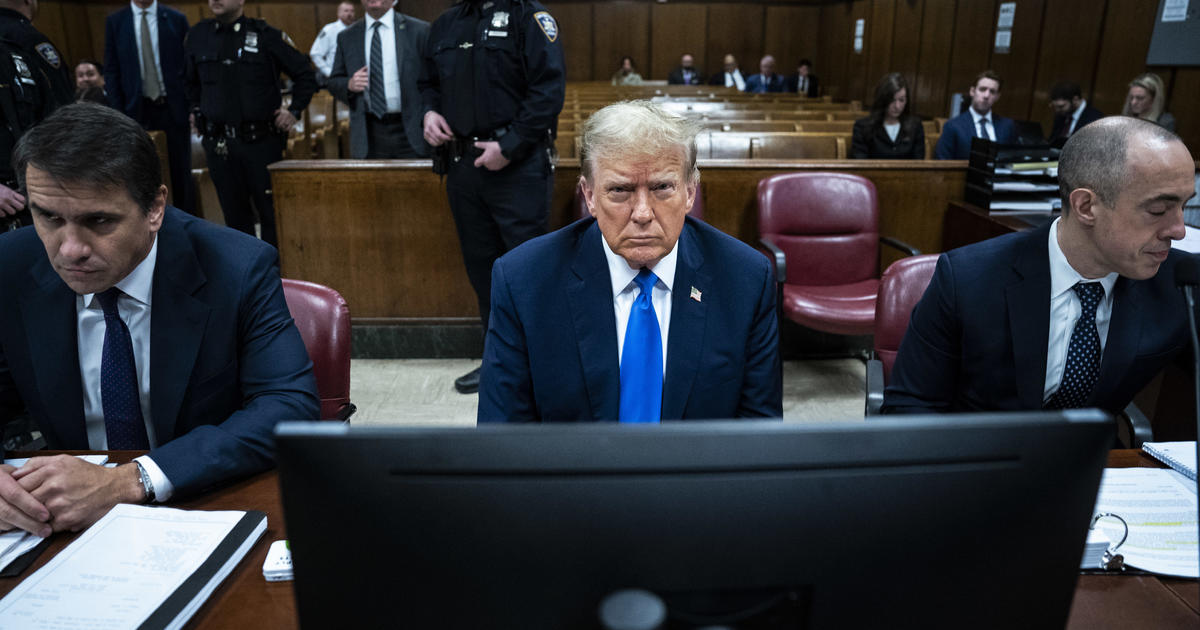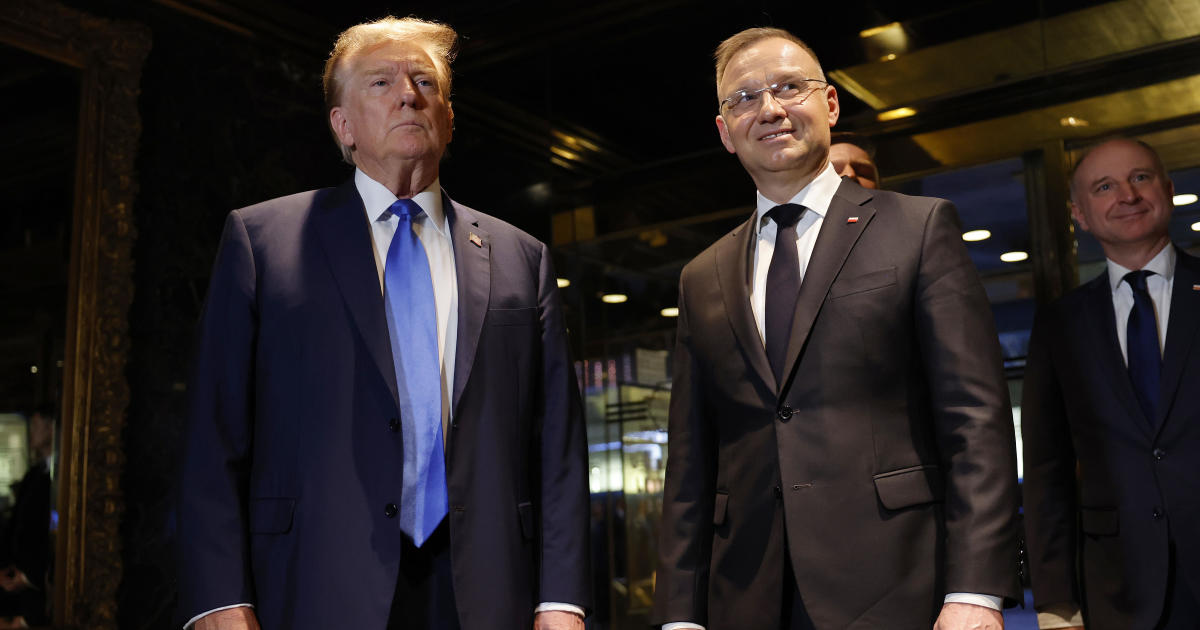Evangelical leaders who supported Trump's presidency are waiting for other candidates in 2024
Rev. Franklin Graham, one of the nation's most prominent evangelical leaders and high-profile supporters of former President Donald Trump, says he won't be endorsing anyone in the 2024 Republican primary race.
"I'm going to stay out of it until after the primaries have finished," Graham told CBS News before he gave the closing prayer at the March for Life rally on Friday in Washington, D.C.
Graham, who left the Republican Party in 2015 and has been an independent since then, does not generally endorse during the primaries, but his decision not to support Trump's primary bid for 2024 may nonetheless come as a surprise because he was such an outspoken defender of him during his presidency and predicted in 2020 that Trump would go down in history as "one of the great presidents."
Graham's decision not to endorse during the primary isn't a "big decision — it's an easy decision," he said.
"I'm just not going to get involved in supporting this one over that one. Let's just let the people decide. And when the dust is settled, I'll make a decision on that point," he added.
Graham, the president of the charity Samaritan's Purse, showed an early interest in Trump's presidential aspirations. He said in 2011 that Trump "might be" his pick in the 2012 presidential race (Trump opted not to run). He also spoke at Trump's 2017 inauguration.
Although Graham didn't endorse in 2016, he held rallies across the country during the primary and general election to boost evangelical turnout. He later called Trump's 2016 victory a sign "God's hand was at work."
In December 2020, Graham tweeted that he "tend[s] to believe" Trump's false assertion that the 2020 election was stolen and criticized the 10 House Republicans who voted to impeach him after the Jan. 6 attacks on the Capitol.
Several other evangelical leaders, too, are waiting for the field to fill out in the next few months. It's a sign that although he's the former president and the only declared candidate, Trump is not entering the upcoming GOP primary season with the full backing of key allies and supporters.
"I think [the evangelical vote] is always up for grabs. I don't think any politician should take it for granted," Graham said.
According to CBS News exit polls of the 2016 primaries, White evangelicals made up nearly half (48%) of the GOP primary voters that cycle. Trump won the support of White evangelicals in 19 of the 28 states where primary exit polls were conducted.
Former Vice President Mike Pence, an evangelical Christian and potential 2024 contender, is already trying to make inroads with these voters.
He's on a tour of megachurches that began at the First Baptist Church of Dallas with Pastor Robert Jeffress, which irked Trump, who characterized Jeffress' very act of hosting Pence as "a sign of disloyalty." Jeffress said the event did not signify an endorsement for Pence.
"There's great disloyalty in the world of politics and that's a sign of disloyalty. Because nobody has ever done more for [the] right to life," Trump said on "Real America's Voice" last Monday.
In an interview with CBS News, Jeffress said he has had "some communication" with Trump since those comments. While he said he declined to describe his conversation with the former president, he "didn't put a lot of stock" in Trump's accusation of disloyalty.
"My lack of offering an endorsement had nothing to do with a diminishing enthusiasm of President Trump. I have been his most vocal and visible evangelical supporter since 2015. I just felt like it was a little early to be doing that. And I think the best decision is to keep my powder dry for right now," Jeffress said, adding that "there may be a time" where his endorsement for Trump "may be more useful than it is right now."
Jeffress did not endorse Trump in the 2016 primary, but did introduce him at a campaign rally in Iowa before the caucuses. "I want you to know I would not be here this morning if I were not absolutely convinced that Donald Trump would make a great president of the United States," he said in his introduction.
Jeffress said he may still endorse Trump during the primary. He called Trump the "presumptive nominee, given the field as it is" and said that evangelicals don't "know much" about Florida Gov. Ron DeSantis, who is widely seen as Trump's biggest threat in a primary so far.
"If I had to bet money, and I'm a Baptist pastor, so I don't bet money, but if I had to, I would say Trump is going to be the nominee in 2024," he said. "I think it's going to be an uphill climb for anybody to run against Trump at this time."
But many evangelical leaders seem to be interpreting the GOP's failure to flip the Senate and its disappointingly slim House majority as a sign evangelical voters shouldn't automatically align themselves with the former president.
And they believe other options, like DeSantis, Pence, former Secretary of State Mike Pompeo, former South Carolina Governor Nikki Haley and others, deserve consideration from the Republican-heavy evangelical voting base.
"His comment on Jeffress, that we're 'disloyal.' I would argue it's not disloyal, it's maybe just being smart," said Bob Vander Plaats, an influential conservative activist in Iowa, as well as president and CEO of the socially conservative Family Leader organization.
Vander Plaats, who has never endorsed Trump but voted for him twice, called Trump "the biggest risk" for the Republican party going into 2024 because of the Jan. 6 attack, the drift of suburban voters from Republicans to Democrats during Trump's tenure and the GOP's lackluster results in the 2022 midterms.
In 2015, Vander Plaats endorsed Cruz in December 2015, two months before Cruz won the Iowa caucuses and Trump placed second. He did not endorse Trump in the 2016 general election but as a Iowa delegate, he cast his convention vote for Trump.
He didn't endorse him in 2020 either, but he did pen an op-ed in support of him for the general election and did vote for him.
"The dynamics have changed," he said. "I'm not saying [evangelicals] would never get behind him in a general election, but there's no doubt their enthusiasm has greatly waned on the former president."
Trump blamed Republican midterm losses on the party's handling of abortion after the landmark abortion rights law Roe v. Wade was struck down. And he criticized GOP candidates like Tudor Dixon of Michigan and Doug Mastriano of Pennsylvania for not supporting abortion exceptions for rape, incest or to save the life of the mother.
"If you don't have [those exceptions] I think it's very, very hard to get elected," Trump said last Monday.
He added that evangelical leaders and anti-abortion activists "could have fought harder" on abortion, too.
"I didn't see rallies, I didn't see protests. The only rallies I saw were the ones that I gave… a lot of them didn't fight, or weren't really around to fight. And it did energize the Democrats." Trump said.
Graham said he "would disagree respectfully" with Trump's assessment that the issue of abortion became a liability for the GOP, but credited him, Pence and Senate Minority Leader Mitch McConnell for their work to put conservative justices on the Supreme Court, which made overturning Roe v. Wade possible.
Jeffress said "there's some truth" to Trump's assessment on the issue of abortion, and acknowledged that the refusal by some Republicans to consider any abortion exceptions meant they "paid a political price."
"I don't think he was weighing in on the morality of exceptions. I think he was just saying that's not where most people are, and he's correct about that," he said.
Vander Plaats said Trump's critique is "pure BS."
"It's shifting blame. You're throwing the most loyal voting bloc for conservatives under the bus," he said, and added that pro-life Republicans in Iowa saw success. "Sometimes a leader needs to look in the mirror. And in this case, he's not looking in the mirror — he's casting blame outside the window."
And Vander Plaats suggested blaming conservatives for evangelicals' shortfall in the midterms could cost him the support of these voters.
"They're looking beyond Trump, they're looking into having an adult in the room," Vander Plaats said. "The evangelical vote is wide open in 2024 — you don't become the nominee without that vote."
Robert Costa contributed reporting.



